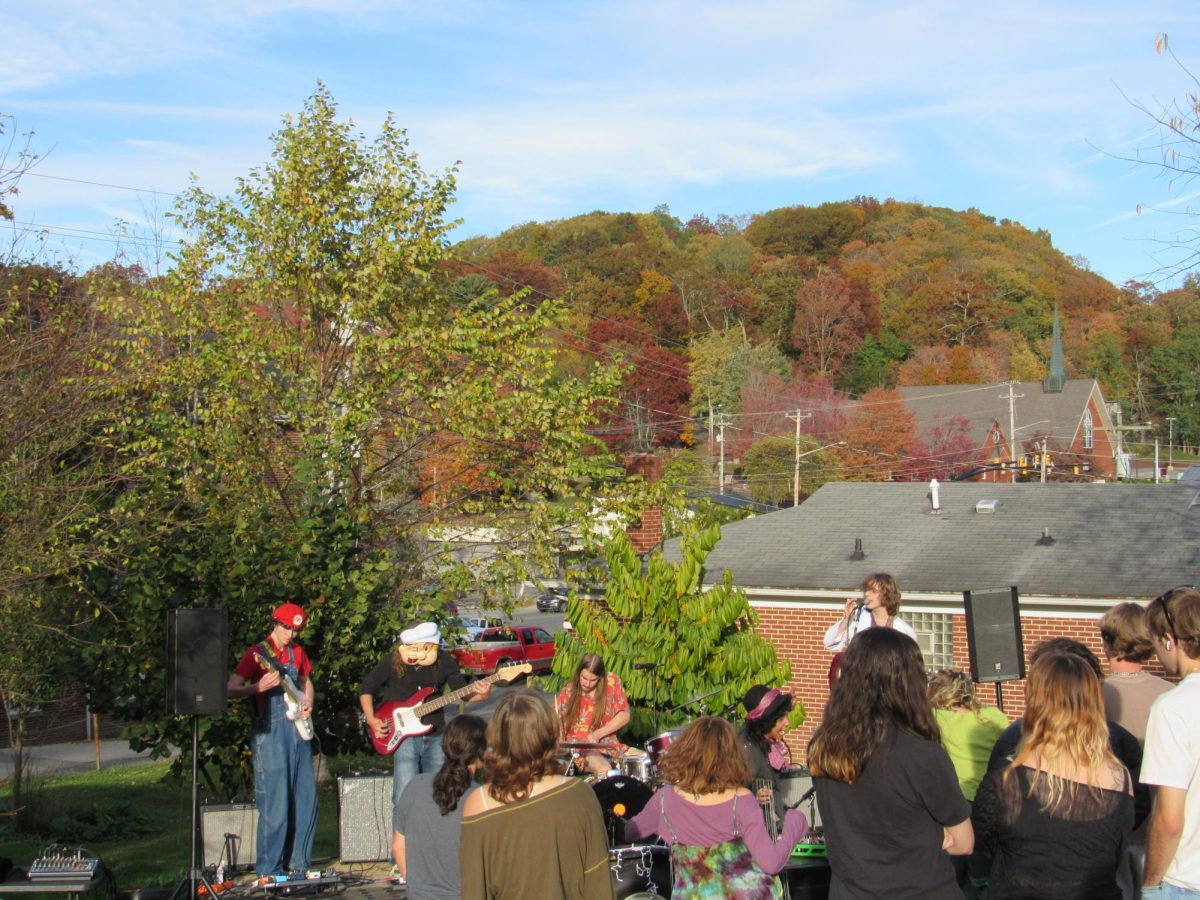Upholstered in forest green, the seats at The Appalachian Theatre of the High Country await any cinephile, theater junkie or fan of live music.
A notable landmark of downtown Boone, Appalachian Theatre has a rich history filled with local stage plays, blockbuster hits and rising stars all underneath its glowing marquee.
According to their website, the theater was built in 1938 as a roadhouse for smaller acts traveling through the Blue Ridge Mountains. In January of 1950, an unattended popcorn maker ignited a fire that spread throughout the theater’s auditorium. While there were no casualties, the damage to the building took five months to repair.
The theater returned with a curved apron stage, a CinemaScope screen — producing widescreen pictures — and Art Deco sconces, which can still be found in the theater today. While these updates helped attract a larger audience, cinema and the film industry continued to develop, rendering these updates obsolete by the late 1970s.
Suzanne Livesay, the executive director of Appalachian Theatre, said the rise of in-home televisions reduced the theater’s ticket sales, prompting them to reduce prices and become a budget theater.
“We get so many former students from App ‘I remember this place when the floors were sticky and it was the dollar theater.’ They all say the dollar or budget theater, second run theater, and we still are a second run theater,” Livesay said.

As an independent theater, decreasing sales and the growing presence of multiplex theaters near Watauga County led the historic theater to close in November 2007.
After it was sold to a Florida developer, the interior of the theater was stripped with the intention of turning the building into a speakeasy-esque performance hall. This rebrand ultimately slipped through the cracks of bankruptcy and any plans of construction went static for years.
In 2011, a town hall meeting was held at the Watauga County Public Library where community members, alongside local legends Doc Watson and John Cooper, voiced their support for the theater to be revitalized.
The town of Boone purchased the building and embarked on a journey of reinvention, restoring the venue as a reflection of its historic beauty while embracing the changing culture of creativity in the High Country.
Appalachian Theatre strives to create a space for young artists of all disciplines, stretching their stage beyond the curtains of cinema. In February, the theater hosted NouN, App State’s Improvisational Comedy Troupe, and in April, they opened their stage to VoiceMale, App State’s premier all-male a capella group.
Following their debut performance at the theater in February, NouN sold out the Community Room at Appalachian Theatre, a smaller venue located on the second floor of the building.
“I’m a big huge fan of improv being a theater person,” Livesay said. “So I said, ‘What if we have you try it once? and I’ll give you the space,’ and that was the deal. As I said, ‘I’m going to take the risk because I believe there’s an audience for this. I’ll give you the space if you will come do it.’”
Livesay said NouN was redirected to perform in the main auditorium for future shows after selling out the community room, scheduling four shows for the upcoming fall semester.
App Theatre also offers performance production opportunities, which recent App State alumnus Nathan Asher took advantage of. Asher found App Theatre while looking for ways to expand his knowledge of recording engineering and live sound production.
“I applied to Appalachian Theatre originally because of the opportunity to serve as a monitor engineer and front of house engineer for local and touring acts, and I only found out about Boone’s vibrant theatrical community after I joined the team,” Asher said.
Asher, a graduate in music industry studies with a concentration in recording and production, encountered various aspects of performance production from sound to lighting, giving him hands-on experience before entering the industry.
“I got to meet so many different people, wear many different hats, and experience what it’s like to work with people who value you as a person and a student,” Asher said.
Within his first couple of months, Asher was able to help with App Theatre Summer Musical Theatre Camps, which are open to elementary and middle school students.
“Between a crew of summer apprentices, a full technical team and our supervisors, we got to help these students have a real performance that they could be proud of,” Asher said.
While some of the work he was tasked with seemed tedious, including assembling the orchestra pit and painting the stage, Asher found these to be some of his most rewarding shifts.
“Even though it took a lot of work and patience, it was so clear that everyone there loved what they were doing, and the care each of the staff members had for ensuring the success of these kids was palpable.”
App Theatre has a long history of providing locals, students and visitors with versatile opportunities to get involved with live performance art, blurring the lines between performer and spectator.
“We really want to create an excellent experience for folks,” Livesay said. “It’s not just written that we hope our audiences have a good experience here, we want our artists to also have a good experience here.”








